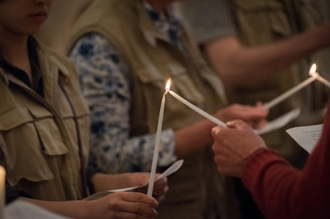Holy Land: New group of ecumenical accompaniers deployed

Photo by Albin Hillert
Source: WCC
A new group of 12 ecumenical accompaniers was deployed on 17 April to serve in South Hebron Hills, Jordan Valley, Bethlehem, and Jerusalem.
During the recent term of the outgoing accompaniers, a series of alarming developments were observed in the West Bank and Jerusalem. The accompaniers noted with deep concern a growing pattern of coordination between Israeli settlers and the Israeli Security Forces in actions that have directly targeted the Indigenous Palestinian population.
In two separate incidents in the South Hebron Hills, settlers, accompanied by police, forcibly seized livestock from local Palestinian families. In the Jordan Valley, Israeli Security Forces imposed a blockade on a village, effectively facilitating acts of settler vandalism while obstructing neighboring communities from providing aid.
The accompaniers also reported the construction of segregated roads around East Jerusalem, amounting to a de facto annexation of approximately 3% of the West Bank. These roads are expected to severely restrict the movement of Palestinian communities, limiting their access to vital services such as healthcare, education, and livelihoods. This development is anticipated to intensify the systemic control over these communities and exacerbate existing hardships.
In a speech saying farewell to the outgoing group of accompaniers, and welcoming the new, Iskandar Majlaton, programme coordinator for the World Council of Churches Ecumenical Accompaniment Programme in Palestine and Israel, expressed deep joy and heartfelt gratitude.
"May this celebration be a sign of our common calling to be agents of reconciliation, peace, and justice in the world," he said. "Let us enter this time with open hearts and humble spirits, rejoicing in the gift of communion and the bonds that unite us in Christ."
Majlaton also acknowledged the current challenging times, and the devastation of the prolonged and tragic war for over 19 months.
"While much of the world's attention has shifted elsewhere, Gaza, the West Bank, and East Jerusalem have remained engulfed in violence and hardship," he said. "While farewells are never easy, it is with open hearts that we welcome new companions on the journey."
Majlaton urged all to lift their voices for a just and lasting peace, for an end to the suffering caused by occupation, and for the strength to live together in Palestine and Israel with dignity, equality, and mutual respect.
"It is important to pause, pray, and thank those who have been ecumenical accompaniers during the past three months, especially in these difficult circumstances," he said. "The group managed to overcome the difficulties and restrictions of the field caused by the extremely tough security situation."
The latest group of accompaniers conducted 718 activities and documented 619 incidents with 828 human rights violations.
"The group's effectiveness is attributed to several factors, including their commitment, dedication, and strong desire to support and stand up for the most vulnerable and disadvantaged people while exhibiting teamwork, maturity, and tolerance," said Majlaton. "To be an accompanier is to take on a profound responsibility."
It means sharing your space and daily life with others, showing courage, patience, and compassion, noted Majlaton. "But the mission does not end when you return home," he said. "In many ways, it truly begins there."
Ecumenical accompaniers return to their home countries as ambassadors of peace. "You become advocates for the voiceless, speaking out for justice, for the oppressed, and for a future where dignity and peace replace occupation and fear," he said.
Read more about the Ecumenical Accompaniment Program here: www.oikoumene.org/what-we-do/eappi


















